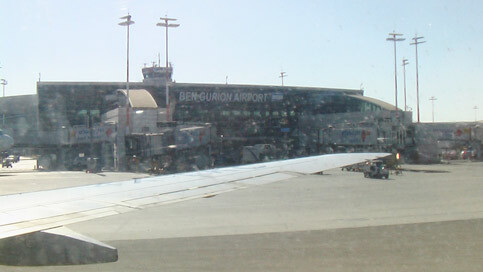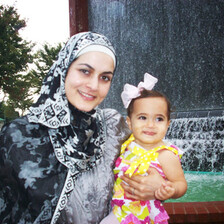Palestine 25 June 2008

Arriving at Ben-Gurion airport in Tel Aviv. (Sumia Ibrahim)
The young, dark-haired woman behind the glass stamped the American passport in front of her. “Welcome to Israel,” she said cheerily. The line in front of me receded quickly as passport after passport was stamped, and traveler after traveler admitted entry. I made my way to the desk and slid my passport under the glass.
“Hello,” I said smiling. After over a 15-hour flight from Philadelphia, US, which included a two-and-a-half-hour layover in Barcelona where I was searched and questioned, and where my bags were carefully examined by hand, I was anxious to breathe fresh air and catch up on sleep. Given the fact that I was extensively questioned and searched by Israeli airline security in Barcelona, I expected to undergo minimal additional security measures at Ben-Gurion Airport in Tel Aviv, if any. The woman scrutinized my passport, which held a red sticker placed by Israeli security in Barcelona, and called over another airport official. “Come with me,” this woman said, leading me to a nearby seating room. Rows of people waiting for their passports to be stamped stared at me as I walked by. Most of them, American and European Jews, would have no trouble entering. It’s quite a different story for an Arab American.
In the sitting room was a family of five: one mother and four children. The youngest, a boy of about four, sat in a chair sliding a small toy truck over the armrest, while the rest of the family slouched in their chairs looking exhausted. I found out that they were Palestinian Americans from California. “We’ve been waiting here three hours already,” the mother said to me, shaking her head. “Can’t they tell we are just a family who want to see our relatives?”
After 20 minutes of waiting, a middle-aged man led me into a small office. He did not wear a uniform, but a short sleeved blue collared shirt which matched his immediately penetrating eyes. Semi-casual dress in other circumstances may have been comforting, but for an airport security official to be sitting comfortably in a cotton shirt while young officials around him were clad in uniforms, it implied higher authority. Indeed, he soon revealed that he held a high position in Israeli security. After several minutes of questions regarding my religious background, my Arabic language proficiency, my major in college, and my employment, he turned to my reason for visiting Israel. I told him that as a recent university graduate, I wished to spend my summer touring the area and conducting research at Haifa University while staying with a friend in Israel.
He was not content with my answer. “How do I know that you’re really just visiting Israel?” he said, after several minutes of detailed questions regarding the friend in Israel. “How do I know you’re not going to the West Bank? How do I know you won’t end up at a demonstration against Israel? How do I know you won’t go work with Palestinian organizations, NGOs [non-governmental organizations] they call them?” Immediately it was clear: visiting Palestine is illegal. Helping Palestinians, showing discontent with Israeli policies peacefully, and spreading truth about Israeli policies in the West Bank and Gaza, are all also illegal.
I was asked to return to the sitting room pending “investigation,” and told that I may very well be denied entry. After a half hour of waiting, during which I met a blind German Muslim woman who described to me the rigorous questioning she undergoes every time she visits the region, the man called me back into his office. He showed me a picture of a young woman on his computer and asked, “Who is this?” I confirmed that it was my Israeli friend with whom I am staying.
“Now lets see if you are telling the truth,” he said, picking up the telephone. “If not …” he put his wrists together as if he were wearing handcuffs. He proceeded to call my friend on the telephone, and conversed in Hebrew with her for several minutes. When he hung up, he raised his voice and exclaimed: “You lied to me! You told me you were staying with her all summer. She told me you were staying with her until you found another place. Should I shut the door right now and hit you?”
We sat in silence for several seconds. “If you lied about this, what else are you lying about? It’s not about you,” he continued, “There are hundreds just like you, who come from America and say they’re just touring Israel. A few weeks later I get a call from the secret service saying they’ve just been arrested for demonstrating in the West Bank.”
I apologized, but told him that I was really looking forward to spending my summer here and did not want to be denied entry. I reiterated that I was not going to be involved in any demonstrations or deliberately put myself in harm’s way.
He repeated the laundry list of don’ts: don’t go to the West Bank; don’t get involved in any political organizations; don’t protest; don’t volunteer for an NGO. Otherwise, he said, “you’ll end up in jail.”
He then informed me that he will order the secret service to monitor me, and told me that he will contact my friend in Israel next week and that I “better be with her.” He walked me to where my luggage was being held, saying until the very end, “I don’t know about you.”
After two and half hours of questioning, I was relieved to leave the airport. But I was one of the lucky ones. Many sources have reported that an increasing number of Arab Americans are being denied entry in the past few years and further increased after Israel’s war on Lebanon in the summer of 2006.
My experience revealed a great deal about Israeli policies adopted since the start of the second intifada in 2000. Israel has determined that it is illegal to visit the Palestinian territories, illegal to reveal the truth about the lives of Palestinians, and certainly illegal to try to help in any way. This has been compounded with decades of Israeli attempts to deny Palestinians’ existence, identity and culture, all part of its attempt to annex the rest of Palestinian land and solve the “Palestinian problem” once and for all.
Palestinians have known for a long time that their continued existence has been rendered illegal; thus, their land is being taken, they are being confined in open-air prisons, their houses are demolished, and they are arbitrarily arrested, tortured, and killed. However, Israel relies on manufacturing international sympathy and maintaining financial and military support to achieve these goals. This can only be achieved by making Palestine, and truth, elusive to foreigners.
Sumia Ibrahim is an Iraqi-Palestinian American residing in Birzeit, Palestine this summer. A recent graduate of Rutgers University in New Jersey, an activist of several years against the US war on Iraq, and a media advocate against racial profiling since her profiling experience at JFK airport in Fall 2006 , Sumia is the recipient of the Rachel Corrie Scholarship from the Palestinian American Women’s Association to study at Birzeit University this Summer.



